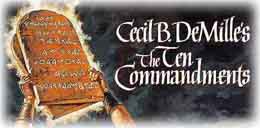|
|

|
|
|

|
The real Ten Commandments': the book is even better than the movie
By Judy R. Gruen
LAST FRIDAY NIGHT at our Shabbes dinner, my husband asked our children
to name their favorite Jewish holidays. Happily, they had trouble limiting
their choices. Even more gratifying for me personally, Passover rated four
stars on nearly everybody's list.
When I was a child, Passover seemed a dreary and unfathomable week
of crumbling matzah sandwiches at school, an empty bread drawer at home, and
solemn, drawn-out seders. I wanted to feel enthralled by the miraculous salvation of
my Jewish ancestors, but the hagaddah bored me. Did it really matter how many plagues
afflicted the Egyptians at sea versus on land?
With my limited and uninspired Hebrew school education, my understanding of
our Festival of Freedom was obtuse. Good thing for me that Cecil B.
DeMille's Technicolor version usually aired sometime during the holiday.
It wasn't until I was an adult and involved in the first sophisticated Jewish learning of
my life that Passover began to seem relevant and compelling. The dramatic escalation of
the Jews' oppression, later matched by a corresponding escalation of terrifying plagues aimed at their Egyptian taskmasters, took on new meaning. I discovered how more than 200 years of
slavery had caused the Jews to fall to a spiritual nadir, a majority of them identifying with their oppressors and even refusing to take part in the exodus. Their sudden moonlit escape from Egypt was also more than a dramatic device, it was a lesson in human psychology.
Having fallen so low, the Jews were one level away from being beyond redemption. The moment
had to be seized for the people to be saved.
Our Jewish ancestors weren't just running away from slavery they were, under G-d's protection and Moses' direction heading toward an uncharted future where they would accept divine deliverance for the price of becoming His chosen people, with all the obligations that entailed. Along the way, they stumbled: Even as they waited for Moses to descend from Mount Sinai with the Ten Commandments, the Jews defied the prohibition against idol worship (a seemingly irresistible lure of the era). They complained about conditions in the desert; some expressed regret at having left Egypt.
During those difficult, trying weeks Moses still managed to convince this headstrong
group of God's continuing protection, and that the bargain they had made would be worth
it in the end. Imagine the incredible resolve and strength of Moses, who, without benefit of any management training manuals, kept this stiff-necked, complaining people from splintering apart!
As I learned more, my Charleton Heston image of Moses faded away, replaced by a
more realistic image of the complex, multi-faceted man that the Torah depicts.
The Torah's Moses is a great man whose greatness was also tinged with personal failings.
When God first taps Moses to lead the emergent Jewish nation, Moses steps back from the burning bush to say, "Sorry, I think you've got the wrong guy. First of all, I've got this stutter. ..."
Moses has a list of excuses as long as the Nile why he can't possibly be the one G-d wants for this historic mission. Later, well into his leadership, Moses is punished severely for another weakness: losing his temper and striking the rock.
The Passover experience sweeping saga that it is is also a critical link in the chain of all Jewish history. Our slavery and exodus from Egypt were the "boot camp" preparation for our receiving of the Torah. We would not have been ready spiritually or psychically for the revelation at Sinai
if not for the hardships and the tests of faith that we endured first. So deeply is this holiday etched in our Jewish hearts that throughout the liturgy, it is the exodus from Egypt, even more than the creation of the world, for which we consistently thank G-d.
Our deep-rooted stubbornness, revealed so powerfully in the Passover story, also helps to explain why we clean our houses so scrupulously in preparation for the holiday. For years, I wondered what all this sweeping and shelf-paper had to do with helping to raise our spiritual awareness.
And then a wonderful teacher gave me the gift of a great insight: the chametz (leavened products) that we search for and remove from our homes is more than just physical; it represents the arrogance in each of us that makes our own egos "rise" and often, steers us towards the pursuit of self-gratification and material conquests rather than spiritual attainments.
As the philosopher, Rabbi Nosson Scherman, has written, our exile "alternate[s] between grinding oppression and spiritually debilitating affluence." Thinking about how to root-out our own arrogance becomes a spiritual "housekeeping" exercise as much as a thorough search for that
hidden Cheerio under the refrigerator or the alarming half-sandwich in your kid's backpack whose age can only be determined by carbon dating.
Our slavery in Egypt was like a long labor; the exodus an allegory for our birth as a nation. It may have taken me till adulthood to begin to appreciate the magnificence of Passover, but at least I finally learned enough to be able to vote in agreement with my kids. Passover is one of my
favorite holidays,

Judy R. Gruen is a writer in Venice, California.
2/3/98: Second thoughts on 'The Keepers of the Flame'